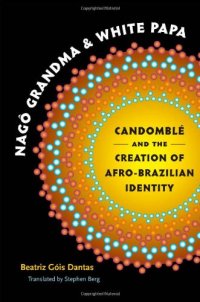
Ebook: Nagô Grandma and White Papa: Candomblé and the Creation of Afro-Brazilian Identity
Author: Beatriz Góis Dantas, Stephen Berg
- Series: Latin America in Translation / en Traducción / em Tradução
- Year: 2009
- Publisher: The University of North Carolina Press
- City: Chapel Hill
- Language: English
- pdf
Nago Grandma and White Papa is a signal work in Brazilian anthropology and African diaspora studies originally published in Brazil in 1988. This edition makes Beatriz Góis Dantas's historioethnographic study available to an English-speaking audience for the first time. Dantas compares the formation of Yoruba (Nago) religious traditions and ethnic identities in the Brazilian states of Sergipe and Bahia, revealing how they diverged from each other due to their different social and political contexts and needs. By tracking how markers of supposedly "pure" ethnic identity and religious practice differed radically from one place to another, Dantas shows the social construction of identity within a network of class-related demands and alliances. She demonstrates how the shape and meaning of "purity" have been affected by prolonged and complex social and cultural mixing, compromise, and struggle over time. Ethnic identity, as well as social identity in general, is formed in the crucible of political relations between social groups that purposefully mobilize and manipulate cultural markers to define their respective boundaries—a process, Dantas argues, that must be applied to understanding the experience of African-descended people in Brazil.
Nago Grandma and White Papa is a signal work in Brazilian anthropology and African diaspora studies originally published in Brazil in 1988. This edition makes Beatriz Gois Dantas's historioethnographic study available to an English-speaking audience for the first time. Dantas compares the formation of Yoruba (Nago) religious traditions and ethnic identities in the Brazilian states of Sergipe and Bahia, revealing how they diverged from each other due to their different social and political contexts and needs. By tracking how markers of supposedly "pure" ethnic identity and religious practice differed radically from one place to another, Dantas shows the social construction of identity within a network of class-related demands and alliances. She demonstrates how the shape and meaning of "purity" have been affected by prolonged and complex social and cultural mixing, compromise, and struggle over time. Ethnic identity, as well as social identity in general, is formed in the crucible of political relations between social groups that purposefully mobilize and manipulate cultural markers to define their respective boundaries—a process, Dantas argues, that must be applied to understanding the experience of African-descended people in Brazil.
Nago Grandma and White Papa is a signal work in Brazilian anthropology and African diaspora studies originally published in Brazil in 1988. This edition makes Beatriz Gois Dantas's historioethnographic study available to an English-speaking audience for the first time. Dantas compares the formation of Yoruba (Nago) religious traditions and ethnic identities in the Brazilian states of Sergipe and Bahia, revealing how they diverged from each other due to their different social and political contexts and needs. By tracking how markers of supposedly "pure" ethnic identity and religious practice differed radically from one place to another, Dantas shows the social construction of identity within a network of class-related demands and alliances. She demonstrates how the shape and meaning of "purity" have been affected by prolonged and complex social and cultural mixing, compromise, and struggle over time. Ethnic identity, as well as social identity in general, is formed in the crucible of political relations between social groups that purposefully mobilize and manipulate cultural markers to define their respective boundaries—a process, Dantas argues, that must be applied to understanding the experience of African-descended people in Brazil.
Download the book Nagô Grandma and White Papa: Candomblé and the Creation of Afro-Brazilian Identity for free or read online
Continue reading on any device:

Last viewed books
Related books
{related-news}
Comments (0)